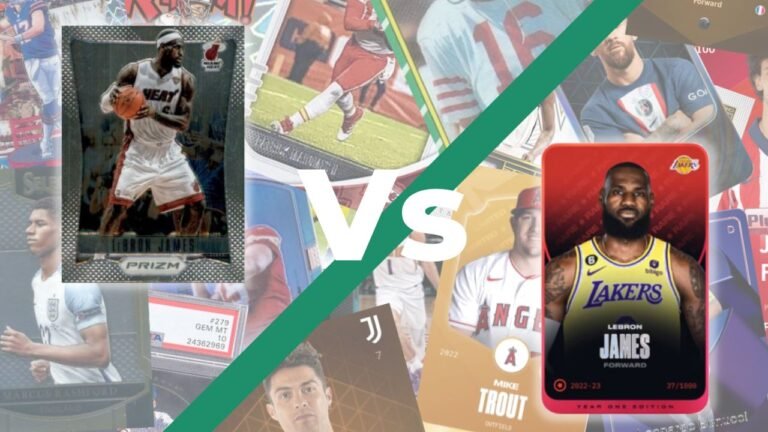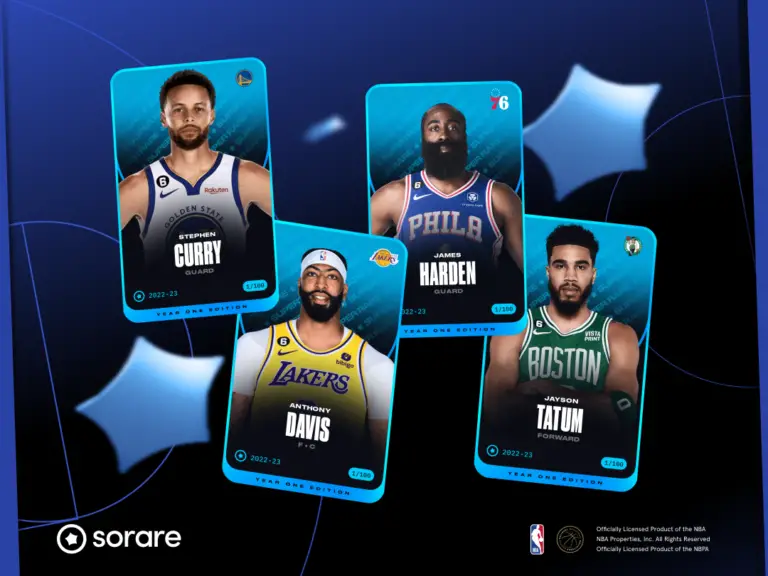
Physical sports cards have been a staple of sports memorabilia and collecting culture for many years now.
Humans love collecting things, and what better for sports fans than cards from their favorite sport, featuring their favorite team and players – Some do it for pleasure and nostalgia, others for the status and prestige of owning highly-desirable and rare cards, and others as an investment – to make money from the hobby.
In the age of digital assets and cryptocurrencies, it’s the natural progression to see the popular sports card collecting hobby go digital as well.
Having digital sports collectables expands the possibilities of the hobby – For example, the rise in fantasy sports games, and sports betting has been huge in recent times, NFT sports cards allow for the potential to combine those elements, which is something you can’t do with physical sports cards.
So, should you collect digital sports cards? I’m not saying they should replace physical cards completely – In fact, many in the hobby are skeptical about the idea of digital cards, but let’s take a look at some of the benefits over physical card collecting, and the case for digital cards having a place in the hobby.
What Are Digital Sports Cards?
Digital sports cards share pretty much all characteristics of a physical sports card, just without the physical touch. However, they do have some added utility potential over physical sports cards.
They come in the form of an NFT (Non-Fungible Token) – Which, in short, are digital assets that exist as unique digital tokens and are stored on a blockchain, which is essentially a secure and decentralized digital ledger that records transactions.
They’re designed to look like a physical card, but instead of being made of cardboard, they live on our screens instead.
Digital sports cards still feature players from our favorite teams and sports – The rise of NFTs has seen the introduction of officially licensed digital cards for the NBA, NFL, MLB, NHL, Premier League, and so on.
They are typically traded through online marketplaces and platforms using cryptocurrencies, such as Ethereum.
The Benefits Of Digital Sports Cards
We’ve established what a digital sports card is, but why collect them instead of just sticking with physical sports cards? Here are some of the benefits of digital sports collectables.
Accessibility
Digital sports cards can be accessed from anywhere, at any time, as long as you have an internet connection. This is not the case with physical cards, which require you to physically possess them in order to view or trade them.
Collectors can also showcase their digital sports card collection with others in the hobby anywhere in the world – A big appeal with sports cards, for some, is the status of owning the most valuable and rarest cards, so being able to showcase their digital collection so easily, with proof of ownership, is a positive.
Easier & Quicker Trading
Blockchain transactions can occur almost instantly, without the shipping fees and shipping time that you get with physical cards.
With NFT sports cards, collectors and investors can buy and sell a card in the same day or week, if they want to, without hassle.
So basically, the digital sports card market can be much more fluid than the physical sports card market, which is particularly good for sports card investors.
From a card manufacturer’s point of view, they also avoid the costs and time that comes with physical production of cards.
Increased Security
Many things can happen to a physical card – It can be lost, stolen and damaged.
Digital sports cards are more secure than physical cards, they can be protected by encryption and other security measures, which can help prevent fraud and unauthorized access.
Also, you obviously can’t damage an NFT sports card, so there’s no need to factor in condition when buying them – Something we use grading for with physical cards, as a way of certifying the condition and authenticity, which is often a costly and slow process.
Card Utility
Many platforms, like OWNIC and Sorare, have combined fantasy sports with digital sports card collecting already.
It works by collectors buying cards featuring players, as you would with physical cards, and then entering those digital cards into their fantasy style game, where the real life performance of the player determines how the digital card equivalent performs in that game – Collectors can win rewards in the form of cryptocurrency, other cards, match tickets etc, by buying and owning these NFT player cards.
The possibilities that having an NFT on a blockchain gives to collectors, means digital cards have potential to offer so much more than just collecting and owning them.
The Similarities Between Digital And Physical Sports Cards
Collectibility
Both digital and physical sports cards are collectable items that can be bought and owned by anyone.
The principle of collecting them is the same, and proof of ownership is recorded and set in stone on the blockchain for NFT cards – Yes, you can screenshot an NFT, as many argue, but that doesn’t change the ownership records being there for everyone to see on the blockchain, and only the owner of the actual token will benefit from further utility possibilities with the card.
Collectors buy the cards from their favorite sports, of their favorite teams and players, and build a collection – That doesn’t change whether it’s physical cards or digital; Both feature images and the name of the player that’s featured, for example.
Scarcity
Many sports cards, both digital and physical, are produced in limited quantities, making them rare and valuable.
We’re used to seeing numbered physical cards these days, and NFT sports cards are often minted a limited amount of times as well.
Trading & Investing
Just like physical sports cards, digital sports cards can be bought, sold, and traded among collectors and fans.
Digital sports cards can also be considered as an investment, to profit from by flipping them, which is the same as physical sports cards.
Licensing & Authenticity
Both types of cards can be verified for authenticity, with physical cards often featuring a certification of authenticity from the manufacturer or a grading company, and digital cards being verified on the blockchain.
Digital Sports Cards Or Physical Sports Cards?
For me, it doesn’t have to be exclusive one way or the other; The physical touch and the aura of owning physical cards can’t be replaced by digital cards, but the game utility and accessibility of digital sports cards can’t be replicated with physical cards.
There are pros to both, and I certainly wouldn’t want to see the death of the physical sports card collecting hobby, that many of us have loved for years, but I do think there’s also space for NFTs – They’re a nice option for sports card collectors and investors to have, and I think those in the hobby can build their collection in both formats, should it appeal to them.


